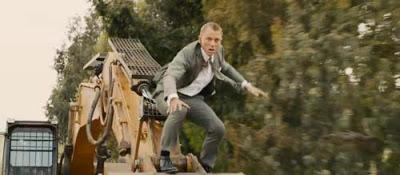Format: DVD from DeKalb Public Library on rockin’ flatscreen.

When you play around with a legend, you always run the risk of losing a big part of your audience. Look at what happened with the Star Wars prequels. Look at what happened with the fourth Indiana Jones film. With Skyfall, the umpteenth James Bond film, the final product takes the entire franchise in a new direction. Risky, that. And yet, if it’s done well, the results are fantastic, as is the case here.
Skyfall is the 23rd official James Bond film, not counting the television and spoof versions of Casino Royale and the unofficial Never Say Never Again. As a film this far in the franchise would be, there are plenty of expectations from the viewers. Skyfall plays with many of these, and does so perfectly. In doing so, the film modernizes the franchise in substantial ways, opting less for traditional James Bond gimcrackery and gadgetry and more for modern reality and geopolitics.
For instance, one of the old hallmarks of James Bond films was the super spy gadgets. Bond could always be counted on to get an explosive device disguised as a pen or a car with secret weapons mounted front and rear. Here, when Bond (Daniel Craig) meets up with Q (Ben Whishaw), his gadgets consist of a plane ticket and passport, a pistol keyed to Bond’s palm print, and a small radio device. That’s it. No bullet-firing fountain pen, no suitcase jet pack. Just a gun and a transmitter. So when a classic Bond gadget from the past does show up, it plays not only as a bit of nostalgia, but also as homage to the earlier films in the series. The fact that Q is substantially younger than any such version of the character in the past is just as noteworthy.
For a long time, Bond films have traded on their opening, and Skyfall is no different here. Bond and an unnamed fellow agent (Naomie Harris) are in pursuit of a man who has stolen a hard drive filled with the names and locations of NATO agents currently infiltrating terrorist groups. This leads to a long chase sequence that culminates with a fight on top of a rushing train. Bond’s co-agent is instructed to take a shot to end the battle. She does, hitting Bond and presumably sending him to his death as he falls off the train and into a river far below.
But of course Bond isn’t dead. He simply takes this opportunity to retire quietly, at least until the knowledge of the stolen hard drive becomes public and the British government begins an inquiry into the inner workings of MI6, and specifically of MI6 chief M (Judi Dench). Out of a sense of loyalty, Bond returns to help track down the hard drive and put an end to the chaos. This is another place where Bond canon is played with. I’m no Bond expert, having seen just over half of the films in the series, but I don’t recall any time in the past when MI6 was specifically called out to defend its actions to the British people. Ralph Fiennes shows up here as someone who is both sympathetic to M’s plight and wanting to see her retire.
The biggest change, though, is Bond himself. In the past, James Bond was always seen as something indestructible, a force of nature unto himself and all but unstoppable. Here, the cracks are starting to show. He’s drug- and alcohol dependent and looks as if all of the missions he’s done are showing. In fact, he fails all of the tests necessary for him to reclaim field agent status, a fact that M hides from him when she clears him to go back into the field. It’s shocking to see Bond as merely human, to see him bloodshot and missing targets when he fires at them.
Just as modern is our villain here. Rather than a bizarre scheme to melt the polar ice caps or irradiate all of the gold in Fort Knox, Silva (Javier Bardem) only wants revenge on M for what he sees as her betrayal of him in the past. To enact this revenge, he doesn’t need voodoo or a space station or a giant submarine. Instead, he uses guns and high-level hacking to play with MI6’s computer systems.
This has been a trend with James Bond films since Daniel Craig took over the role. I didn’t see Quantum of Solace, but Casino Royale certainly plays with the real world far more than did earlier films in the franchise, particularly the cheesier films in Roger Moore’s catalog. Especially with Skyfall, it is very much as if the franchise is moving into the same realm of realism as the Bourne films while maintaining the same high level of excitement and action.
I see that I haven’t really talked much about the film itself here, and I’m okay with that. Honestly, it’s not a film that specifically turns on its plot, and any sort of plot would be roughly the same here. This is much more about the character of James Bond and his dealing with his own personal demons and breakdowns and seeing him in action.
A last excellent break with the previous films in the series? Our unnamed agent at the start of the film proves to be Eve Moneypenny, who has been M’s secretary throughout the James Bond golden age.
Bottom line: Skyfall is less a return to form for the James Bond franchise and more a well-designed and coherent redirection of a franchise that needed a shift to stay both relevant and interesting.
Why to watch Skyfall: James Bond made legitimately modern.
Why not to watch: It might be too long, but only maybe.
